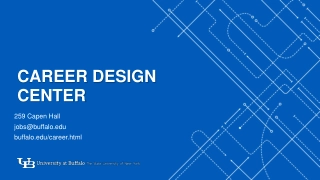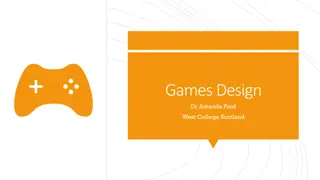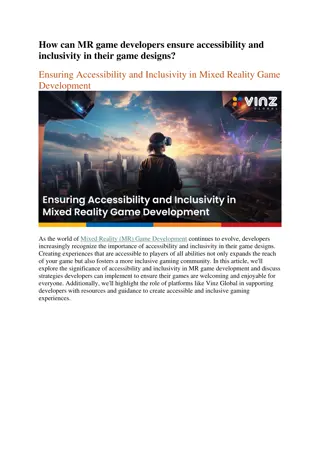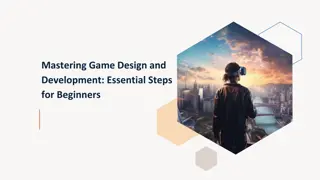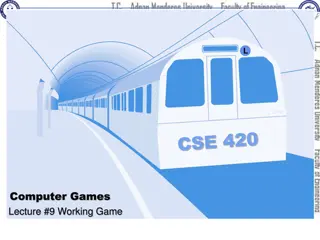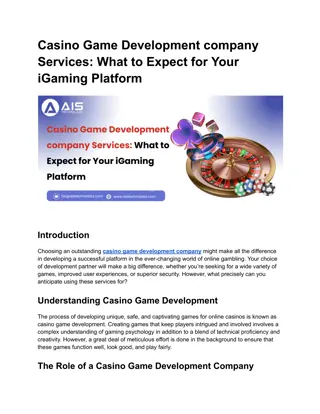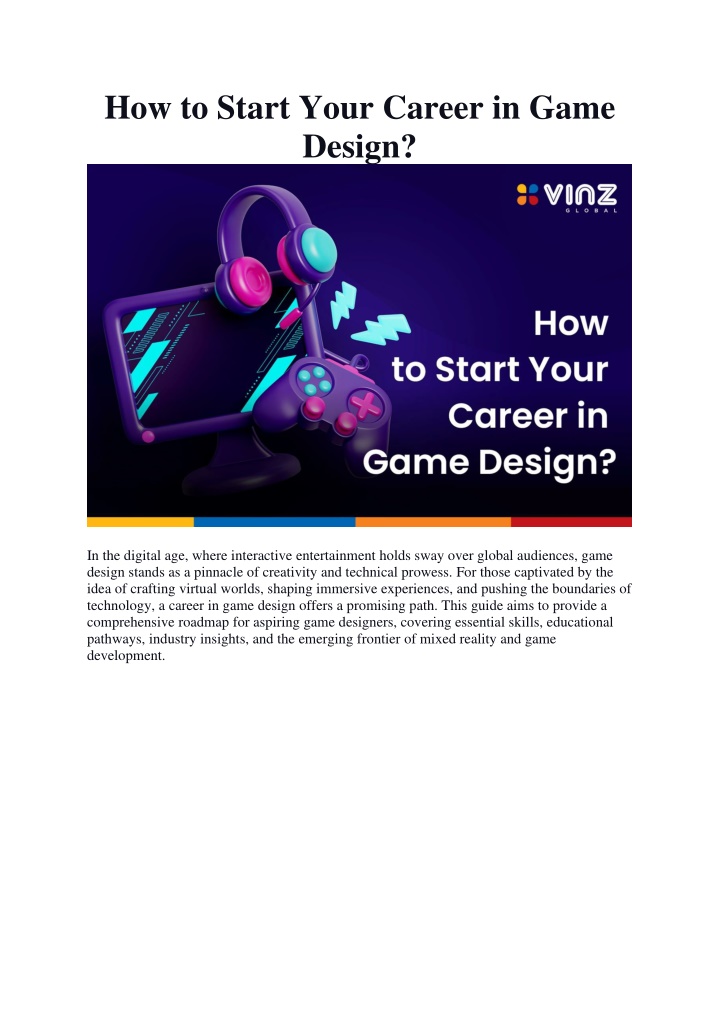
How to Start Your Career in Game Design?
In the digital age, where interactive entertainment holds sway over global audiences, game design stands as a pinnacle of creativity and technical prowess. For those captivated by the idea of crafting virtual worlds, shaping immersive experiences, and pushing the boundaries of technology, a career in game design offers a promising path. This guide aims to provide a comprehensive roadmap for aspiring game designers, covering essential skills, educational pathways, industry insights, and the emerging frontier of mixed reality and game development.
Download Presentation

Please find below an Image/Link to download the presentation.
The content on the website is provided AS IS for your information and personal use only. It may not be sold, licensed, or shared on other websites without obtaining consent from the author. If you encounter any issues during the download, it is possible that the publisher has removed the file from their server.
You are allowed to download the files provided on this website for personal or commercial use, subject to the condition that they are used lawfully. All files are the property of their respective owners.
The content on the website is provided AS IS for your information and personal use only. It may not be sold, licensed, or shared on other websites without obtaining consent from the author.
E N D
Presentation Transcript
How to Start Your Career in Game Design? In the digital age, where interactive entertainment holds sway over global audiences, game design stands as a pinnacle of creativity and technical prowess. For those captivated by the idea of crafting virtual worlds, shaping immersive experiences, and pushing the boundaries of technology, a career in game design offers a promising path. This guide aims to provide a comprehensive roadmap for aspiring game designers, covering essential skills, educational pathways, industry insights, and the emerging frontier of mixed reality and game development.
Understanding Game Design and Development Game Design Fundamentals: At its essence, game design is the art and science of creating interactive experiences. It involves designing gameplay mechanics, defining narrative arcs, crafting visual and audio elements, and ensuring overall user engagement. Game designers blend creativity with technical proficiency to deliver compelling experiences that resonate with players. Industry Landscape: The game design and development industry is diverse and dynamic. From established giants to innovative startups like Vinz Global, which pioneers in Mixed Reality & Game Development, there are numerous opportunities across various platforms and genres. Understanding the industry trends and demands is crucial for aspiring game designers.
Steps to Kickstart Your Game Design Career 1. Define Your Passion and Specialization: Game design encompasses a broad spectrum of roles and responsibilities. Begin by identifying your specific interests within the field. Are you fascinated by storytelling and narrative design? Do you enjoy crafting intricate game mechanics? Are you intrigued by the possibilities of emerging technologies like mixed reality? Clarifying your passion will help you focus your efforts and tailor your skill development accordingly. 2. Acquire Relevant Skills and Knowledge: Game Design Principles: Familiarize yourself with the fundamental principles of game design, including game mechanics, player psychology, level design, and balancing gameplay elements. Resources such as online courses, books, and tutorials can provide a solid foundation. Technical Proficiency: Depending on your chosen specialization, develop proficiency in relevant tools and software. For instance, if you're interested in level design, learn to use game engines like Unity or Unreal Engine. For narrative design, focus on storytelling techniques and scriptwriting. Artistic Ability: While not mandatory for all roles, a basic understanding of art and design principles can be beneficial. Familiarize yourself with graphic design, 2D/3D modeling, animation, and digital art creation tools. Programming Skills: Although not always a prerequisite, having a basic understanding of programming languages such as C#, JavaScript, or Python can significantly enhance your versatility as a game designer. 3. Gain Practical Experience: Create Your Own Projects: Start building your portfolio by working on personal game projects. This could range from simple prototypes to more complex games. Focus on demonstrating your creativity, problem-solving skills, and ability to implement game design principles effectively.
Collaborate with Others: Join game development communities, forums, or local meetups to collaborate with other aspiring developers. Participating in game jams or hackathons can provide invaluable hands-on experience and networking opportunities. 4. Pursue Formal Education (Optional): Degree Programs: Consider enrolling in a formal degree program in game design, computer science, or a related field. Many universities and colleges offer specialized programs that provide comprehensive training in game development, including design, programming, and project management. Online Courses and Certifications: Alternatively, if formal education isn't feasible, numerous online platforms offer courses and certifications in game design and development. These courses often provide practical, industry-relevant skills that can supplement self-study and personal projects. 5. Stay Updated on Industry Trends: Follow Industry News: Stay informed about the latest developments, trends, and technologies in the game industry. This includes advancements in mixed reality (MR) and augmented reality (AR), which are increasingly shaping the future of gaming experiences. Attend Conferences and Events: Participate in game industry conferences, workshops, and seminars. These events not only provide learning opportunities but also allow you to network with industry professionals and potential employers. The Future of Game Design: Mixed Reality and Beyond As technology continues to evolve, the intersection of game design with mixed reality (MR) presents exciting new avenues for innovation. MR combines elements of virtual reality (VR) and augmented reality (AR), offering immersive experiences that blur the line between
physical and digital realms. Companies like Vinz Global are at the forefront of exploring these possibilities, creating games and applications that leverage MR technology to deliver unprecedented levels of interactivity and immersion. For aspiring game designers, embracing emerging technologies like MR can open doors to pioneering roles in spatial computing, interactive storytelling, and experiential design. Developing skills in MR game development requires a blend of creativity, technical expertise, and a deep understanding of user interaction within virtual environments. Conclusion Embarking on a career in game design requires dedication, creativity, and a willingness to adapt to an ever-changing landscape. Whether you aspire to work for a renowned studio, join an indie game collective, or innovate with emerging technologies like mixed reality, the key lies in building a strong foundation of skills, gaining practical experience, and staying informed about industry trends. By following the steps outlined in this guide and remaining passionate about your craft, you can embark on a fulfilling journey towards becoming a successful game designer in today's dynamic digital landscape.
Content Courtesy url https://medium.com/@vinzglobal.social/what-is-virtual-reality-vr- experience-augmented-reality-ar-experience-and-how-does-it-work-7e24e15578b6 Contact US Website https://vinzglobal.com/mixed-reality-and-game-development/ Mobile +91 7030090136 Mail- vinz.sales@vinzglobal.com


